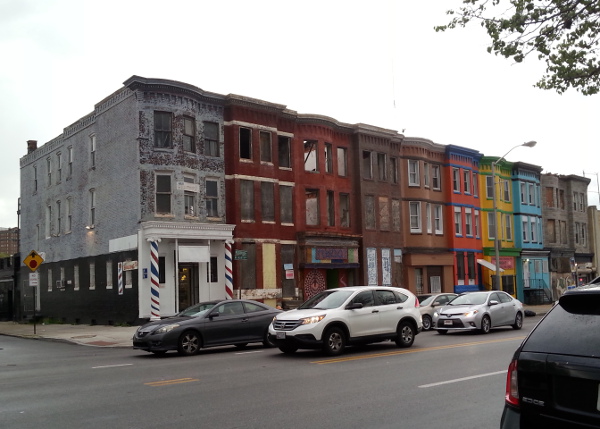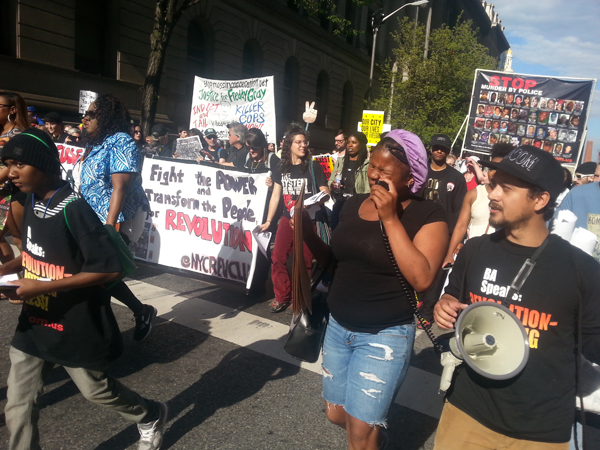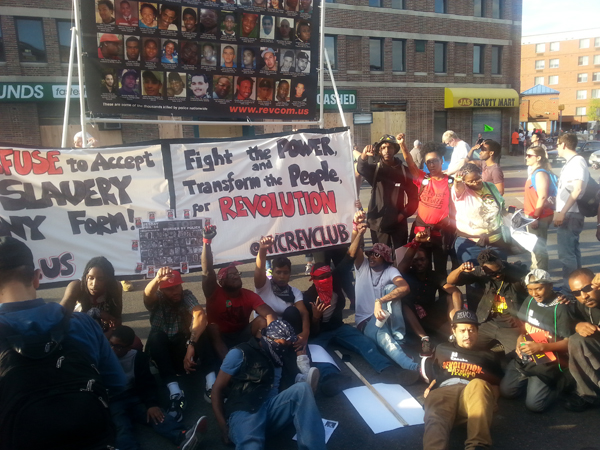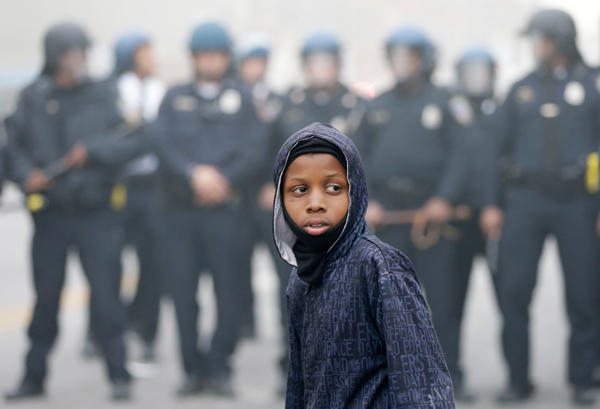There are times when you are reading about something happening to other people, and you can FEEL it as if it were happening to you. From civilians being bombed in the Middle East, to police murder right here. The tears of parents and children losing those closest to them is so fucking real it hurts. Because the loss is real. As Bob Avakian said, " Just because it isn't happening to you, doesn't mean that it's not happening!"
Interviews in West Baltimore:

Get with the

Revolution Club, Baltimore, May 2. Photo: Special to revcom.us

Baltimore, May 2. Photo: Special to revcom.us
Interviews in West Baltimore:
Living Amid Poverty and Police Violence...and Fighting for a Whole Different World
May 18, 2015 | Revolution Newspaper | revcom.us
Baltimore, Maryland is a major city in this country that is not only marked by extreme poverty and degradation for hundreds of thousands of Black people, but as a central part of that oppression, by brutal treatment and murder at the hands of the police. Anger and outrage boils all the time and has risen to the surface. As people have lifted their heads, stood up, a core of people have been drawn to the revolution and to fighting for a different world, free of all oppression. Recently, in the wake of the uprising and rebellion protesting the murder of Freddie Gray, reporters from revcom.us had the unique opportunity to interview Black people of different ages who are living and working in West Baltimore.
As we arrive in West Baltimore, the first thing that jumps out are the boarded up row houses everywhere—and then every block or so amidst a row of houses, there will be one place with a wreath on the door or a plant on the stoop. Families are still living there. But what about the places where people used to live...where are the people now? How are they surviving? At a stoplight, you see homeless people trying to eke out an existence on the streets.

"In West Baltimore, the first thing that jumps out are the boarded up row houses everywhere—and then every block or so amidst a row of houses, there will be one place with a wreath on the door or a plant on the stoop. Families are still living there. But what about the places where people used to live...where are the people now? How are they surviving? At a stoplight, you see homeless people trying to eke out an existence on the streets. "
Photo: Revolution/revcom.us
Photo: Revolution/revcom.us
It’s not hard to figure out what the backdrop for the rebellion was—as one youth from the Revolution Club said: “People are just struggling to keep up above, you know, just alive, basically out here. It’s real hard for people. Ain’t no jobs. Ain’t shit out here, just abandoned shit. It’s a wasteland. It’s like a prison, it’s like a outside prison, for real.”
The unemployment rate for Black youth in this part of the city is 50 percent. Another Revolution Club youth put it this way: “What really stands out here is this whole third world reality of how people live in the first world reality, and the tremendous poverty... I mean this is a big U.S. city and... out here there’s some working class, but there’s also a lot of just totally cast off sections of the people.”
And in the midst of this, the people are constantly harassed, brutalized, and worse by the pigs who act like an occupying army. One recent statistic that came out gives just one outrageous indication of what the people face: Between June 2012 and April 2015, the Baltimore city jail refused to accept nearly 2,600 people brought to them by cops because they had injuries that were too severe for them to be admitted to jail.
In the wake of the murder of Freddie Gray, the scene is still tense—and people have stood up and said NO MORE! Enough is enough. We are excited and anxious to talk with people from West Baltimore—to learn about their lives and the rebellion itself and how they are looking at the revolution.
First off, the leaders of the Revolution Club are “educating” us: “It’s like the big city of Baltimore but it’s like an old Southern city or something. It’s like the Jim Crow era for real, you know. Black are just like beat down here, badly. We’ve gotta lift these people up. When I drive through I can see everything closed down. Abandoned buildings with wind blowing through ‘em and shit. It’s just depressing as hell. That’s my picture of Baltimore—there’s nothing here. So that’s why I’m like: they ain’t got nothing to lose. But they changed this motherfucker. You ain’t got nothing’ to lose here, you know. And then like you saw how Monday like they rose up and they was like: fuck the police!”
Life in West Baltimore and the Constant Brutality by Police
How are people surviving?
Get with the
Revolution Club here

Revolution Club, Baltimore, May 2. Photo: Special to revcom.us
One of the Revolution Club leaders says, “It’s a good question. It is a lot of young people, you see some of them and what they do, they raise their money, enough to get like some soda and chips and that’s how they do it. And they’re working for somebody. And we hear story after story after story about how much the police are in on a lot of the drug economy, including controlling what market gets to run more freely than others. In other words, in certain parts of town people are picked up if they’re caught dealing and their product is taken and delivered to the other part of town where it’s more regulated by the police. So that’s some of what goes on.
“A number of the women that we’ve met are nurses And that seems to be what employs a good number of people, is the hospitals around here.”
We ask, “You think more of the women have jobs, actually, than men?”
Revolution Club: “Seems like most of the women work and most of the guys are hustling, always hustling trying to sell a shirt, t-shirt, a CD, whatever.... Cuz I don’t see no jobs out here. You might see a corner store but it’s so small, who’s working there? You got like one or two people, maybe working. It’s crazy. I’ve been in other cities too and I ain’t never seen nuthin’ like this. So that’s why I’m like: they ain’t got nothing to lose. But they changed this motherfucker. “
As we talked with people, we learned more about what life is like with the constant police harassment, brutality and murder. Freddie Gray died when he established eye contact with the police—and then ran. People said, “Who would not do the same?”
One woman in her 30s who does volunteer work in the community described the following scene: “It’s really hard. A couple of weeks before Freddie passed, the teenagers were out here running. They were playing hide and seek. It was the sweetest game of teenage boys playing hide and seek ever in the field. But I told them, I was like: ‘You guys really shouldn’t...’ I didn’t want to tell them to stop playing. But I was like, ‘You really shouldn’t run around because they may think that you’re running from something that you didn’t do.’ You can’t tell them to not play. Teenagers playing hide and seek, are you serious?!... These are all straight A students. They’re all straight A students.
“So I just saw them running outside, and all I could think was they might be killed because they’re just playing. That’s something that you don’t want to, as a volunteer, think about. I don’t want to think about that when they’re outside playing. But that’s real. Like even the coach at the recreation center in this neighborhood, some days he doesn’t have practice because you just never know.”
C is a young man in his mid-20s who grew up in Baltimore. He works as a cook. He describes the daily harassment and brutality from the police: “I been working since I was 10, selling newspapers, anything I could get my hands on, to touch something. But we’re not looking for a dollar any more. It’s crazy. I think they just trying make us fellows be nothing because they take from us. And for us to lash out like we did last week, to show them that we’re tired of it. Cause we tired, we’re human beings, cause overall we’re getting scrutinized by somebody that think that just because we are Black we gonna go out and commit a crime. There’s thousands of millions of brothers and sisters that go out there that make an honest living, not to commit crime.
“Last week I got stopped five times. What’s that? I can’t go out to the corner store, if I put something in my pocket, they think it’s drug money. I got victimized by the police. I got brutalized by the police in 2012. All because I was walking in a drug neighborhood. So they thought I was a druggie, chased me, dragged me across the asphalt. I didn’t reach out to do nothing cause it happens every day. They not going to get in trouble for it. They are not going to answer for it because there’s a brotherhood within the brotherhood within the police department.”
The Youth Rose Up—and Changed Things

Baltimore, May 2. Photo: Special to revcom.us
The youth and others made a statement in rebelling. It started off when the police shut down the major transportation hub at the mall at around 1 o’clock in the afternoon. At the same time, the high school forced the students to leave. The consequence? The Revolution Club reports: “All these youth, and some regular people from the neighborhood, were all gathered there because everything was shut down and they had nowhere else to go. People were mad and they didn’t know why the riot cops were there. And whatever people came there thinking that they were going to do or not do, what the police did actually drew some lines about what was going to happen. People just took all the Stolen Lives posters we had and started walking right up to the line of riot cops with the posters. They were just holding it up. People would walk up to the line and run back because the police would move like they were going strike or pounce on people. So there was a lot of that—people testing how close they could get with the posters.”
The youth refused to back down in the face of the police repression—and they rose up and changed things.
From the Revolution Club: “That rebellion was something great. It uplifted people here and around the whole world. It uplifted people everywhere. And now people thinking that after this rebellion, they thinking a lot of the police gonna get off. And they like: what we gonna do next? They thinking about what’s next. They feel it. But then there’s also people who don’t feel it, you know, that are trying to ignore it, trying act like it’s not going on and will just go back and be happy in their safe, regular lives...
“Since Ferguson it’s kind of been a whole political situation that’s been in a lot of motion—and then there is Baltimore. The rebellion here was quite a bit more fierce. Overwhelmingly the rebellious youth were confronting the police. The news showed videos of the police cars trashed and burning. There was even this scene where we were walking and some of the kids started throwing stones at the construction workers for a second, and other people were like: Nah, they ain’t police. Stop that! And some people grabbed them and said no, that’s not what we’re doing.
“What was the rebellion about? People were just tired of living this way. It’s not the case that it had nothing to do with Freddie and the murder, but it was the case that it was about more than that. It was about how that crystallized how people actually live out here.
“We heard the police was throwing rocks at the people, going for people’s legs. Then the police go running one way and all the kids go running this way yelling to each other as they went: the police coming that way! They were working together, you see. Then you had some guy come out there like: They goin’ kill y’all. He didn’t want them to be fighting the police—they gone kill y’all out here. The reality: the police already killing people. You need to be standing with them. And the youth were like: we’re standing up. The youth didn’t want to hear that shit.
“It was joyous times. Police cars went running through the middle...they would just speed through and all hitting people. It was a lot of high school and some younger that were part of some of the main action. And older dudes, some of them were joining in at different points, but the driving force of it was these high school youth. The police was running from the kids. The kids were just chasing them. I was just like, man...it was so beautiful, you know what I’m saying, to see the police running like that. I never seen the police run like that.
“A matter of fact, in terms of the ‘looting’ that went on: a lot of what you saw in the street of people carrying, you know bussing around a lot of stuff, you saw a lot of Pampers, children’s shoes, laundry soap, diabetes medicine—insulin shots. A lot of that kind of basic necessity stuff. It was also clear like some people were getting this to help other people. You don’t shoplift Pampers for yourself, or the diabetes medicine is probably for your grandma or something like that. And that was a big part of what people took. I’m sure people took sneakers and things like that but it was...”
Accumulating Forces for Revolution
“The youth have the defiance in them: fuck this society and fuck this system because they don’t give a fuck about me anyway. They grab our posters of Stolen Lives—they show them everywhere. They just don’t have a way out. But we do. They don’t want to get their hopes up too high to think that there’s a way out. They want to see if we really down for revolution—and we are. And taking this to them, that’s the great thing I see. I see them as a base to raise up and influence the world—these young people, and the older people too.
“I see them all as a base to do something, even though they not doing nuthin’ now, and they caught up in all this other shit. I just see them as being changed, but it will take struggle, a lot of struggle with these people to change. I see like myself in a lot of these people cuz I see like they went to prison, and I just think that they can do so much better, you know what I’m saying. I know they can. But it’s going take struggling with these people and just...it’s just steady hard struggle to get people out of what they in and it’s going to take work. It’s going to take some time to do this.
“Like what Carl Dix been saying: we gotta make shit clear to people. What is this state prosecutor doing, what is going on? Get into that. Make people aware of that, and more—let them know the problem, the system of capitalism, letting them see how it really works, why does this keep happening. And we’re showing people how serious we are, basically. And just bringing all that we have—our Revolution newspaper, the book BAsics, from the talks and writings of Bob Avakian,everything we have... I think we got a chance to raise people’s sights to something bigger because I see the potential in a lot of these people out here. So that’s why I think they can change and do something a lot better.
“And then we got BA [Bob Avakian] in the world—it’s like the youth and people don’t even know about BA. If they had time to sit down and study the theory of revolution, what the science of communism really is, they could understand the world a lot better. Right now they don’t understand the world. They think a lot of Illuminati, they think a lot of different bullshit that we gotta shake them out of—this religious shit, this gang shit.
“But what we bringin’ is bigger than all of this. It’s just something great. I just think it can change people because I know how it changed me. You know, I could be one of them, just hopeless, you know. But I got hope in this science of communism—that’s the hope I’ve seen.”

